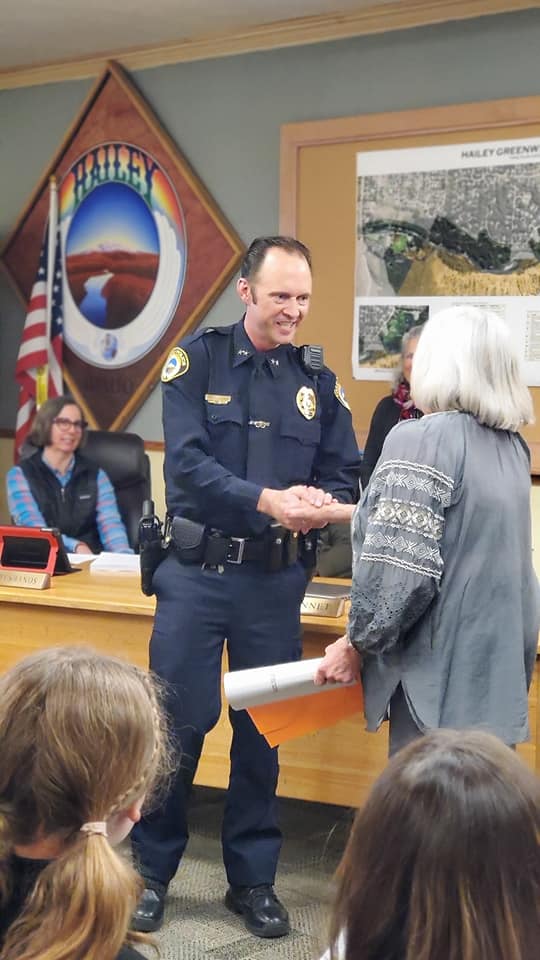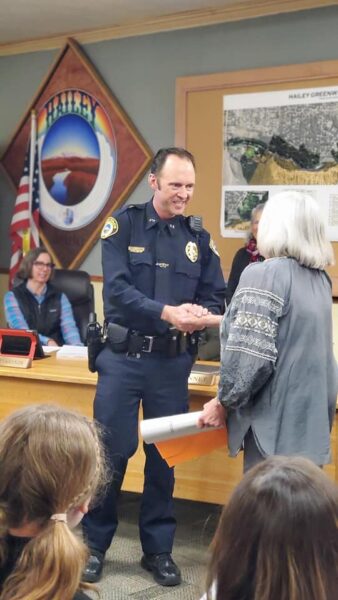
Police chief shares thoughts on ‘defunding’ the police, protecting the public
By Eric Valentine

Photo credit: City of Hailey
If someone told you a month ago that Mitt Romney would march in a Black Lives Matter protest, that Idaho’s Capitol building would have 6,000 mostly white folks wearing black and raising their fists in a black power salute, and that hundreds of Valley residents would brave the coronavirus threat and block off Highway 75, you probably would have chalked it up to delusions from a COVID-19 fever.
As of June 10, that’s the reality in these unprecedented six months we’re calling the first half of 2020. But in some circles, one of the most difficult things to wrap one’s head around is the call to defund—and in some cases—dismantle the police force. What follows is the candid and forthcoming reaction by Hailey Chief of Police Steve England.
It’s important to note that as a courtesy, England was given the opportunity to take questions from Wood River Weekly and provide answers via email. He declined that perhaps safer option and answered all questions posed to him impromptu.
No Fun In Defunding
Across America, there have been calls for defunding police departments, and already some city councils are following through. Defunding refers to the reallocation of a jurisdiction’s resources so that other agencies, departments or individuals would bear the burden of providing particular services rather than law enforcement.
England called the talk of defunding both a potential “slippery slope” and “a Catch-22,” especially when some advocates talk about disbanding or dismantling the police.
“That’s a crime report I would not want to read,” England said, referring to a total removal of law enforcement officers from their beats.
Whichever “d” word is used, the concept driving it is that certain police functions may be better managed and implemented differently by different agencies and individuals. For instance, fire departments may be able to deal with drug-overdose calls sans the police just as effectively. Mental health professionals and qualified social workers could respond to distress calls, like certain suicide attempts, without the presence of an armed cop. Unarmed neighborhood watch groups could monitor their own streets. In theory, that funding then could be diverted to youth programs, job-creation efforts, affordable housing, and similar areas that are understood to be socioeconomic factors that trigger crime.
England noted that right now emotions are high and that his hope is that in the near future a careful analysis of what, if anything, gets defunded would take place.
“What could work in Hailey would not necessarily work in L.A.,” and vice versa, England said.
England also pointed out that the idea of being able to reallocate funds may not be as simple and straightforward as imagined. Calls for more officer training, more body cameras, more oversight as well as the costs involved with training other agencies and individuals to perform the duties that would be removed from cops’ to-do lists also have a price tag. And, England said, in a budget year already impacted by COVID-19, there would be some hard decisions to make.
However, it should be noted that most advocates for defunding are not promoting it as a cost-saving measure but rather a public safety issue. And even England acknowledges that officers may be getting asked to wear “too many hats,” he said.
Voices In The Valley
Local protesting reached its peak on Tuesday when hundreds of residents walked the streets and at one point a group of them blocked off Highway 75.
“We didn’t like that very much, but we understand,” England said.
According to England, there were no incidents of vandalism resulting from the protests and the public was kept safe.
“We consider that a success,” England said.
The other element of local law enforcement England sees as a success is his department’s policies and procedures and that there was no need to “reinvent the wheel” for Hailey.
England said he understands other frustrations associated with law enforcement, too, and that a lot of times it’s because what a citizen is dealing with is civil, not criminal, in nature.
“I want people to know we do what we can,” England said. “I want people to know they have a voice, we take complaints, we hear suggestions and opinions; we take them seriously.”


